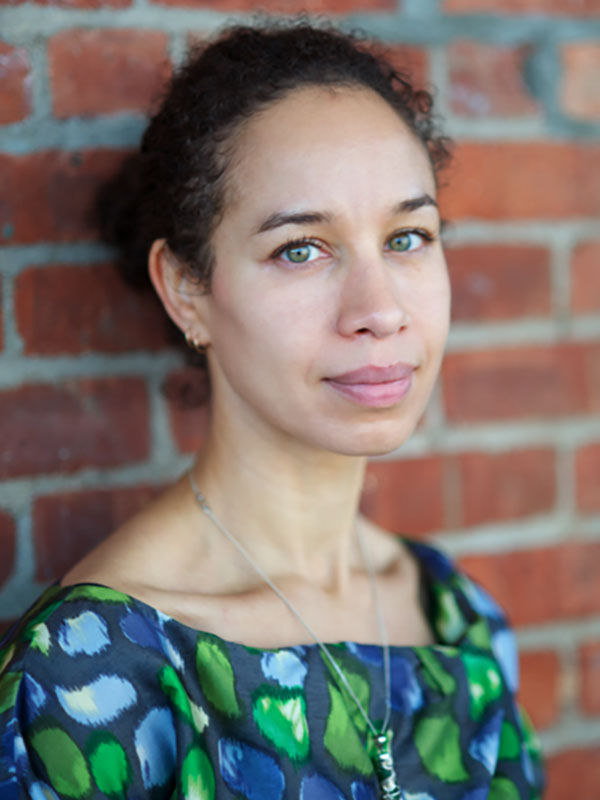“I arrived on this Big 10 University campus and really fell in love with the idea of research writ large,” Dr. Bernard says, reflecting on her time in Bloomington, where she would often wander the library stacks and submit to the serendipity of intellectual discovery. She found herself especially inspired working with Yusef Komunyakaa, the Pulitzer Prize-winning poet then teaching in the IU English department. The universe of IU’s resources, including the Wells and Lilly libraries, the Eskenazi Museum of Art, and especially the Black Film Center archives, further helped to concretize her broader research interests. “From a disciplinary standpoint, I was introduced there to the idea of African American studies, which hadn’t existed at the University of Manchester [her undergraduate institution],” she says. “Having access to that framework, and being a teaching assistant in that space, was really critical to my thinking and evolution.”
And evolve she did. Dr. Bernard was eventually accepted into Yale’s African American Studies doctoral program, where she completed a dissertation entitled “National Maladies: Narratives of Race and Madness in Modern America.” The project considers how the social and academic fields of anthropology, medicine, and psychiatry have historically fostered connections between “race” and “madness,” especially as they appear in texts by Ralph Ellison, C.L.R. James, and Richard Wright. (While at Yale, she worked closely with Paul Gilroy, whose seminal text The Black Atlantic conjured a universe that she, as a mixed-race British woman with ties to the Caribbean, found profoundly compelling.) After receiving her Ph.D., Dr. Bernard took a job as an assistant professor of English at Georgetown University, before shifting gears just four years later to work as a curator at the Beinecke Library. It was, she admits, an idiosyncratic choice, and one driven more by gut instinct than anything else. “I chose to leave Georgetown because I was personally yearning for something more ‘creative.’ I wanted to return to the archive,” she reflects. At the same time, she watched as dozens of friends and colleagues were denied tenure, or otherwise subjected to tenure requirements that were “quite frankly, draconian.” She felt that she could be doing something more.
Yet this wasn’t the only idiosyncratic career move Dr. Bernard would make. In the spirit of the beloved authors of her archive—writers, thinkers, and artists of color who took major intellectual risks without the benefit of a social safety net—Dr. Bernard made her own leap of faith in 2012, when the exhibition design firm Ralph Applebaum Associates asked her to help develop the National Museum of African American History and Culture at the Smithsonian. “It may have seemed like a strange decision—No one leaves the Beinecke!—but I felt I had the opportunity to combine my academic training with the museum space,” she remembers. That job eventually led to the work that she does today, as director of the Obama Presidential Museum on Chicago’s South Side.
While such a career trajectory might suggest that Dr. Bernard is especially well-connected, it’s worth bearing her background in mind. Growing up in a working-class family in Yorkshire, England—the daughter of a white English mother and a Black Jamaican father—she had nothing to fall back on. Her initial exposure to literature came in the form of what she calls the “triad” of white European men—Ibsen, Strindberg, Chekhov—so her main window into African American culture and thought was through a now defunct independent bookstore called Frontline Books. “That was where, in the early ’90s, you would find thinkers like C.L.R. James and Stuart Hall, beginning to talk about colonial and postcolonial experience in the U.K.,” she says. (It wasn’t just about the reading, either; radical bookstores have long been a hub for political activism. Frontline itself was once raided by the police, who were then searching for records related to anarchist periodicals.) In large part because of her roots, Dr. Bernard is especially clear-eyed about the challenges facing current graduate students in the humanities: “I feel for people who are now faced with challenges that I and my cohort were not faced with in the same way,” she says. “We were obviously living in a privileged space, and there are only ever a finite number of jobs in any given department, but at the time there was a fuller commitment to tenure-track positions across a range of schools.” The shift on the part of many universities to prioritize STEM and business programs often comes at the expense of the humanities, and this shift is one with which Dr. Bernard is deeply concerned.
The vagaries of the academic market notwithstanding, Dr. Bernard still counsels current graduate students to take heart—to be prepared for their own leaps of faith. “Having a humanities Ph.D., I discovered that I had a skillset that was applicable to other related fields,” she says, citing her own field of curatorial and archival research, as well as journalism, ghostwriting, and social justice work with foundations such as Ford and Mellon. “It’s critical thinking, an expansive understanding of the world, an understanding of how culture and politics intersect, all of that is built into the degree whether you realize it or not. It was those skills I applied as the opportunities arose.”
Still, there is something of the literary scholar that lingers in Dr. Bernard. When asked if she has seen the new film adaptation of Nella Larsen’s 1929 novel Passing, she nods discretely, somewhat reluctant. “You know,” she says, her eyes gleaming anew, “That novel is so perfect. It’s just impossible to capture.”

 The College of Arts
The College of Arts